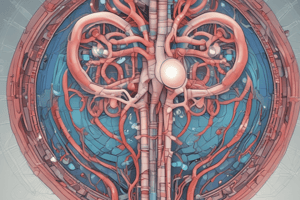Podcast
Questions and Answers
Why should the nurse avoid taking blood pressure measurements on the client's left arm?
Why should the nurse avoid taking blood pressure measurements on the client's left arm?
- To avoid causing discomfort
- To reduce anxiety
- To prevent infection
- To prevent decreased blood flow and clotting due to AV fistulas or grafts (correct)
What is the reason a patient with BPH should see a psychiatrist?
What is the reason a patient with BPH should see a psychiatrist?
- To address underlying depression (correct)
- To discuss medication side effects
- To manage anxiety related to BPH
- To cope with incontinence
Which clients are at highest risk for developing acute kidney injury?
Which clients are at highest risk for developing acute kidney injury?
- Those with BPH
- Those with chronic kidney disease (correct)
- Those with a history of UTIs
- Those with glomerulonephritis
What finding should the nurse report to the provider following a transurethral resection of the prostate?
What finding should the nurse report to the provider following a transurethral resection of the prostate?
What should the nurse instruct the client to increase in their diet with chronic kidney disease?
What should the nurse instruct the client to increase in their diet with chronic kidney disease?
What is an indication that the client is experiencing adverse side effects from dialysis?
What is an indication that the client is experiencing adverse side effects from dialysis?
What is an early manifestation of peritonitis?
What is an early manifestation of peritonitis?
When reinforcing teaching about collecting a 24-hour urine specimen for creatinine clearance, what should the nurse include?
When reinforcing teaching about collecting a 24-hour urine specimen for creatinine clearance, what should the nurse include?
Flashcards are hidden until you start studying
Study Notes
Blood Pressure Measurement
- Avoid taking blood pressure measurements on the left arm to prevent decreasing blood flow and clotting.
- The left arm is often the preferred site for arteriovenous (AV) fistulas or grafts.
Chronic Kidney Failure
- Pathophysiological processes of chronic kidney failure are not specified.
Glomerulonephritis
- Diet restrictions are necessary for a patient with glomerulonephritis.
- Associated findings include:
- Hematuria
- Proteinuria
- Edema
- Hypertension
Urinary Incontinence
Stress Incontinence
- Pathophysiological process involves weakened muscles in the pelvic floor.
Overflow Incontinence
- Pathophysiological process involves bladder outlet obstruction or detrusor underactivity.
Urge Incontinence
- Pathophysiological process involves overactive detrusor muscle contractions.
Urinary Incontinence
- Pathophysiological processes involve weakened muscles, nerve damage, or bladder dysfunction.
Benign Prostatic Hyperplasia (BPH)
- A patient with BPH should see a psychiatrist to address related depression and anxiety.
- Clients most at risk for BPH are:
- Older males
- Family history
- African American males
- Findings associated with BPH include:
- Urinary frequency
- Nocturia
- Hesitancy
- Straining
- Decreased urine flow
Acute Kidney Injury (AKI)
- Clients at highest risk for AKI are:
- Older adults
- Those with pre-existing kidney disease
- Those taking nephrotoxic medications
- Findings associated with AKI include:
- Oliguria
- Azotemia
- Electrolyte imbalance
Post-Operative Care
- Following a transurethral resection of the prostate (TURP), the nurse should report to the provider:
- Hematuria
- Clot retention
- Urinary retention
- The nurse should instruct the client to increase fluid intake in their diet with chronic kidney disease.
Dialysis
- A sign of acute kidney rejection is graft dysfunction.
- Adverse side effects from dialysis include:
- Hypotension
- Muscle cramps
- Nausea and vomiting
- Early manifestations of peritonitis include:
- Abdominal pain
- Nausea and vomiting
- Fever
- Manifestations of a UTI include:
- Dysuria
- Frequency
- Urgency
- Hematuria
Urine Specimen Collection
- When collecting a 24-hour urine specimen for creatinine clearance, the nurse should:
- Instruct the client to discard the first morning void
- Emphasize the importance of completing the entire 24-hour collection
- Ensure the client refrigerates the specimen during collection
Prostate-Specific Antigen (PSA) Test
- Reinforce teaching about the PSA test with a client, emphasizing its role in detecting prostate cancer.
Bladder Trauma
- Manifestations of bladder trauma include:
- Hematuria
- Abdominal pain
- Difficulty urinating
- Pelvic pain
Studying That Suits You
Use AI to generate personalized quizzes and flashcards to suit your learning preferences.




